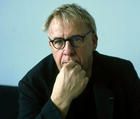
Born in Toledo (Ohio) in 1945. He studied in Toledo (1965) and completed his training at the School of Visual Arts in New York. Soon becomes one of the most important leaders of conceptual art, reaching the absolute rejection of any type of production of works, due to its ornamental nature. His ideas are reflected in the essay Art after Philosophy (Studio international, 1969), in which he cites Duchamp and his "ready - mades" as true creators of the artistic revolution, as he moved from appearance to concept. principle that a work of art is a tautology, coming to express that "art is, in fact, the definition of art". It tackles the artistic theme as a philosophical and linguistic problem, which brings it closer to the Art and Language Group. Formed basically in the artistic field, he also carried out studies in philosophy and anthropology. His career demonstrates his knowledge and affinity with the research methods proposed by the philosophers of language L. Wittgenstein and A. J. Ayer The 1969 work Art after Philosophy is his main manifesto and the place where he develops the theoretical basis of his works. His best-known creations are called Investigations (by Wittgenstein) and consist of devices that examine and reclassify realities through the use of text, whose function is to explore the nature of art and lead it to its dematerialization.




